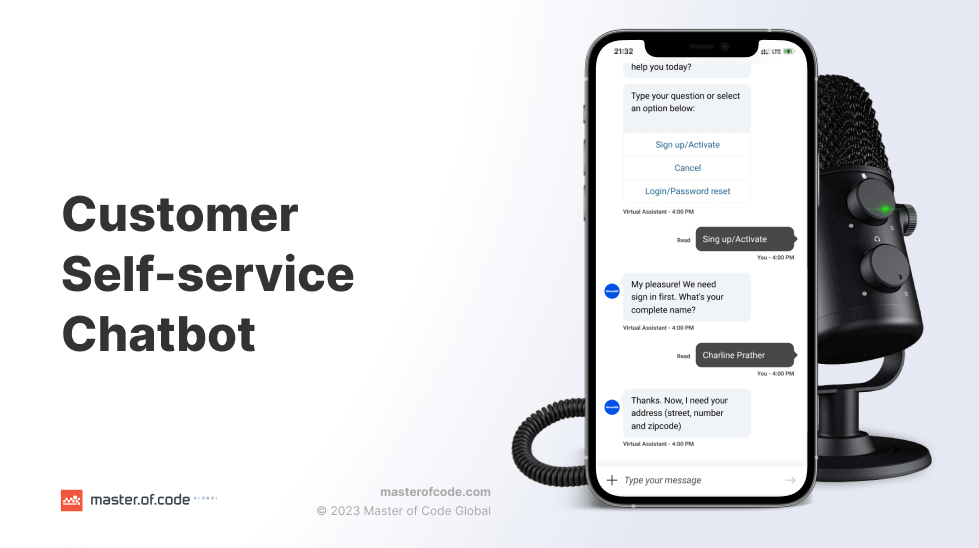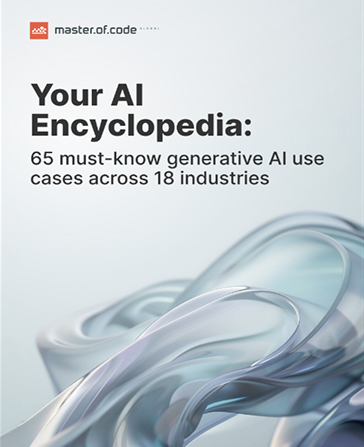The landscape of client support is rapidly evolving, and artificial intelligence (AI) is at the forefront of this transformation. The Qualtrics Consumer 2024 Trends Report underscores the growing influence of AI in customer service, with 48% of consumers expressing comfort in interacting with AI-driven services of organizations. This trend is not just a fleeting one; it’s a clear indicator of AI’s integral role in shaping future care strategies.

Further emphasizing this tendency, a study by Zendesk reveals that 81% of business leaders view customer experience (CX) and support as escalating priorities. Furthermore, 80% of them plan to augment their budgets for these prerogatives in the coming year to stay competitive.
Now, let’s dive deeper into how AI is revolutionizing customer service, exploring its impact and the innovative methods leaders are utilizing to meet these new challenges.
Table of Contents
State of AI in Customer Support
AI’s impact on support service is profound, offering solutions that drastically improve both efficiency and customer satisfaction. Imagine a scenario where a buyer needs quick assistance with a billing query. Traditionally, this might involve a lengthy phone call or email exchange. However, with AI, the client can immediately engage with a chatbot, which either resolves the question on the spot or efficiently directs the consumer to the appropriate human agent.
But what exactly are customers looking for? Here is what the numbers say:
- 80% equate their service experience with the value of products.
- 65% expect businesses to keep pace with their changing preferences.
- 72% demand immediate responses to their queries.
- 71% seek interactions that are both natural and conversational.
- 62% favor receiving personalized recommendations over generic ones.
- 73% will switch to a competitor after just one or two bad experiences.
Recognizing these users’ demands, enterprises are rapidly integrating AI into their operations. AI not only meets expectations but also reshapes support paradigms, offering 24/7 help (44%), faster responses (37%), and improved overall customer experiences (29%). The shift towards AI is a strategic decision, driven by the need to stay competitive in a dynamic market as seen by 72% of executives.
Following the adoption of AI, companies gain significant advantages:
- 61% witness improvements in CX, while 58% see enhanced Customer Satisfaction (CSAT) scores;
- 66% of businesses have achieved or surpassed Key Performance Indicators (KPIs) and Service Level Agreements (SLAs);
- 69% note expanded consumer assistance capabilities, coupled with 55% experiencing reduced wait times;
- 87% observe a reduction in workload due to AI, resulting in 65% seeing lowered operational costs.
These detailed insights highlight the critical role of technology in modern consumer care, particularly when it comes to AI in call centers. The stats demonstrate its capacity to not only meet but anticipate and surpass audience expectations, revolutionizing the way businesses interact with their customers.
10 Pros of Implementing Customer Service AI
From offering solutions before problems arise to breaking language barriers, AI is redefining how businesses and customers interact. Let’s explore how AI can help your enterprise exceed modern customer service demands.

For your business:
- Cost efficiency. AI significantly reduces operational costs by automating routine client care tasks. This increases productivity and allows companies to allocate resources more strategically.
- Sentiment analysis for service improvement. The AI-based system analyzes user feedback and sentiments, providing actionable insights for enhancement. This data-driven approach helps in fine-tuning AI support strategies and improving overall satisfaction.
- Effective customer service training for agents. Artificial intelligence customizes learning modules for client assistance representatives, upgrading their skills and performance. As a result, the company gains a more competent workforce and higher-quality buyer interactions.
- Personalized marketing and sales opportunities. AI-powered tools pinpoint optimal moments for upselling and cross-selling based on user interaction history. Consequently, businesses get efficacious marketing strategies and increased deals.
- In-depth client feedback mining. The technology delves into consumer reviews and answers, extracting valuable insights to improve services. This detailed analysis aids in understanding the audience’s needs and enhancing individual buyer journeys.
For your consumers:
- Predictive personalization. AI analyzes past interactions to personalize future experiences. It predicts your clients’’ needs and tailors responses accordingly. This leads to more relevant product suggestions and a higher level of customer engagement.
- 24/7 multilingual support and instant replies. AI-powered customer service chatbots provide round-the-clock care, instantly addressing common queries in preferred languages. This ensures visitors get immediate help, reducing wait times.
- Emotionally responsive interactions. AI tools can detect subtle cues in communications, allowing for responses that are empathetic and contextually appropriate. This boosts CX by making conversations feel more personal and clear.
- Proactive problem-solving. Artificial intelligence anticipates potential issues based on visitor’s behavior and history, offering solutions before problems escalate.
- Omnichannel and multimodal capabilities. The technology integrates across various platforms, maintaining consistent assistance whether through voice, text, email, or chat.
Applying AI Innovations to Customer Care Strategies
Exploring major AI use cases in business reveals a diverse range of applications, each transforming different aspects of operations and strategy. Here are some key examples.

AI Chatbot-Powered Client Assistance
Using advanced algorithms, AI bots effectively understand and process inquiries, leading to quick resolutions and enhanced user satisfaction. Available 24/7, these chatbots offer uninterrupted assistance, handling multiple questions simultaneously. This allows companies to boost efficiency and reduces wait times.
Moreover, they personalize dialogue based on buyer history and preferences, adapting replies to individual needs. Thus, the tools assist in creating a more engaging experience and fostering client loyalty and trust in the brand. This is particularly valuable in the case of chatbots for contact centers.
Delving deeper, let’s explore how Natural Language Processing (NLP), sentiment analysis, request routing, and voice AI amplify chatbots in customer service.
- Natural Language Processing
NLP enables chatbots to process human language, identifying key information and intent. This makes dialogue with bots more intuitive and human-like. By utilizing NLP, virtual assistants can handle a broader range of questions with a nuanced understanding. They can discern context, making interactions more relevant and effective. - Sentiment analysis
AI technology analyzes text from customer interactions to identify emotions and satisfaction levels. These insights enable businesses to tailor responses and proactively address concerns. The sentiment analysis aids in timely interventions for negative experiences, maintaining positive customer relationships and brand reputation. - Request routing
AI-powered request routing ensures user inquiries reach the right department. It analyzes questions for keywords and context, directing them for appropriate handling. This improves response times and resolution efficiency, reducing the workload on service teams. - Voice AI
Voice-based AI in client service offers hands-free, natural conversational interactions, crucial for call center bots. It handles everything from basic inquiries to complex issues, understanding various accents and speech patterns. This technology ensures effective communication and convenience for a diverse customer base.
Real-World Example:
A North American food services company implemented a Conversational AI chatbot to manage refund requests. This initiative aimed to reduce operational costs, minimize wait times, and standardize the return and reimbursement steps. The bot effectively handles refunds, providing instant information, particularly for orders via third-party services. This solution led to reduced human error, efficient rule application, and lower operating expenses, ultimately improving customer experience.

Results highlights:
- Agent escalation for refund requests dropped between 42% and 66%
- Reimbursement cost savings amounted to $10.2M
- Total refunds provided decreased by 13% to 28%
AI-Driven Personalization in Customer Interactions
AI offers personalized, efficient assistance by analyzing past behaviors. Tailored responses anticipate needs, enhancing satisfaction and streamlining AI tech support. The technology suggests products based on purchase history, aligning with buyer interests. This boosts sales and shows an understanding of consumer preferences. AI’s multilingual capabilities further enhance the inclusive, customized shopping experience.
Real-World Example:
Master of Code partnered with a leading US satellite radio provider to create a highly personalized customer self-service bot. This AI-driven solution was tailored to meet the specific needs of each client, leveraging detailed user insights and preferences to offer a customized experience. The chatbot provided individualized aid for tasks like subscription management, payment processing, and technical support.

Results highlights:
- The chatbot engaged an average of 120,000 users weekly.
- It achieved an 80% containment rate in streaming service inquiries.
- There was a 46% improvement in the subscription rate following the bot’s implementation.
- The assistant processed payments at a rate 1,000% higher per month compared to before.
Transforming Data into Dialogue Through AI Analytics
AI revolutionizes understanding of user behaviors and preferences, offering crucial insights for personalized interactions. It centralizes data, minimizing app-switching and enhancing agent efficiency. AI guides representatives with context-based responses, automating replies for consistency and resource efficiency. This approach aids in resolving queries, anticipating client needs, reducing manual tasks, and improving conversation quality.
Real-World Example:
Luxury Escapes utilized a travel chatbot created by Master of Code to transform their user engagement. This AI-powered bot, designed for personalized experiences, allowed buyers to search for and book luxury travel deals based on their preferences. It significantly enhanced the consumer’s journey by predicting and retargeting their ideal trip destinations with relevant offers.

Results highlights:
- The chatbot achieved a conversion rate 3 times higher than the website.
- Generated over $300,000 in revenue in the first 90 days.
- Retargeting messages had an 89% reply rate.
- Over 6,200 users engaged with the bot in three months.
- Users were retargeted back to the bot over 7,400 times.
- More than 4,070 deals were viewed via the assistant.
Smart Knowledge Base & FAQs Management
Through artificial intelligence development services, businesses can upgrade their databases and FAQs to streamline data accessibility and ensure that content remains accurate and relevant. These systems learn from each interaction, constantly improving response precision. This reduces the need for direct interactions and lightens the load on client care teams, allowing them to focus on more complex issues. Additionally, these AI-driven tools streamline internal processes and provide valuable insights for improvement.
Future of AI in Customer Service
AI is poised to significantly transform the realm of customer support. Here are some pivotal trends likely to emerge in the foreseeable future:
1. Seamless integration of digital and physical experiences
Artificial intelligence in customer service is poised to bridge the current gap between online platforms and in-store experience. With 60% of consumers dissatisfied with the existing situation, the technology is seen by 63% as a key to creating flawless connections. AI will ensure cohesive buyer journeys, integrating all touchpoints for a unified CX.
2. Advanced personalization
Conversational AI for customer satesfaction is moving towards deeply personalized experiences. As 65% of consumers express a desire for tailored offers, AI will evolve to understand individual preferences and histories, offering customized recommendations. This will lead to a more engaged and satisfied client base.
3. Increasingly proactive AI in customer service
AI’s predictive capacity is set to become more sophisticated. With 62% of consumers expecting the technology to anticipate their needs, future systems will proactively address issues and preferences, offering solutions even before customers articulate their demands.
4. Rise in voice interaction and emotional intelligence
The future will see an increased demand for voice interactions with chatbots, as nearly two-thirds of consumers desire more voice-based engagements. Additionally, 70% expect AI to understand and respond to their emotions, indicating a trend towards tools that not only comprehend language but also emotional nuances. Thus, communication with AI-based solutions will become more natural and empathetic.
5. Widespread adoption and increase in investment
With 71% of organizations already leveraging artificial intelligence and more planning to raise their capital infusion, AI’s role in customer care will expand significantly. Businesses are recognizing the substantial ROI that it offers, with an average return of $3.5 for every $1 invested. This also includes improved buyer satisfaction and operational efficiency. The trend indicates a shift towards more AI-centric client service models.
6. More humanlike interactions
Customers anticipate that artificial intelligence will evolve to be more natural and humanlike, with 3/4 expecting it to equal the aid provided by agents. Consequently, leaders are working towards making AI in customer care as indistinguishable as possible from human interactions. Indeed, 75% are targeting the technology to deliver conversational and less transactional experiences. This shift towards tools that emulate human interaction promises to create more relatable, engaging, and effective support.

New Era: Generative AI in Client Service
The rise of Gen AI in customer care marks a significant shift towards a more interactive and personalized approach. This technology is not merely an enhancement but a revolution in interactions, promising a future where AI plays a central role in understanding and meeting buyer needs.
The statistics speak to the growing importance and anticipation of Generative AI for customer service:
- Over two-thirds of support leaders plan to invest more in technology this year.
- 73% believe AI-assisted customer service will be expected within five years.
- 67% of organizations recognize that Gen AI can improve support with automation and personalization.
- 77% of consumers experience faster and more efficient client care, whereas 71% note increased customization.
- Two-thirds of people see artificial intelligence as essential in their future interactions with companies and 82% expect businesses to start implementing Generative AI tools.
Gen AI stands out for its versatile capabilities and use cases. One of its pivotal applications is in enhancing chatbot interactions. These advanced assistants can engage in more human-like dialogues. They understand customer queries in depth and provide responses that feel personalized and thoughtful. Furthermore, AI ensures that language barriers do not hinder the quality of service. All customers can receive help in their native language.
This technology extends its prowess to product recommendation systems. By analyzing a shopper’s past purchases and preferences, Gen AI tailors suggestions, creating a customized shopping experience. In the realm of complaints and queries, it proactively identifies potential issues. The consumers get the solution even before the question is raised. Such an approach reduces frustration and bolsters brand loyalty.
As we move forward, businesses are recognizing the need to integrate more advanced AI into their CX strategies. With Generative AI, interactions are becoming more intuitive and efficient, reflecting the high expectations of today’s audience. The technology is set to become a cornerstone in client support, offering nuanced and adaptive solutions that enhance the user journey from start to finish.
Wrapping Up
When venturing into AI implementation in customer service, several key factors demand your attention. Firstly, developing AI solutions should align closely with your specific objectives. It’s essential to implement robust data management and security protocols, ensuring client information privacy and regulatory compliance. Another critical aspect involves the seamless integration of AI technologies. This guarantees their compatibility with your existing infrastructure, maintaining workflow continuity.
Additionally, designing AI solutions for scalability is crucial. This will allow us to adapt them to both future technological advancements and business growth. Equally important is establishing mechanisms to gather and analyze consumer feedback on AI interactions. This way you will enable continuous service improvement and refinement.
At Master of Code, we excel in addressing these vital considerations, bringing your client care to new heights through AI development service. Our expertise lies in customizing AI solutions to enhance your ROI, cut operational costs, and boost user engagement. Reach out to us, and we’ll ensure your consumers enjoy a superior customer experience, boosting both their loyalty and your revenue.
Let us help you connect your brand with customers where they communicate today. Chat or voice.






